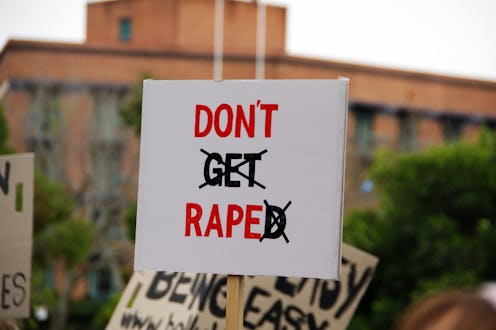Life
Why Are Men Dominating Media Coverage Of Rape?

We already know that women are victims of sexual assault far more frequently than men. Why, then, are more than half of sexual assault stories in the press written by men? A new report from the Women's Media Center detailing how the U.S. media covers campus rape and sexual assault analyzed 940 articles from 12 print outlets and found that 55 percent of news articles on sexual assault in 2014 were written by men, while only 31 percent were written by women. (The remaining 14 percent had no byline.) To put things into perspective, bear in mind that the Centers for Disease Control and Prevention states that 19.3 percent of women have been raped in their lifetimes. For men, it's 1.7 percent. This means we have a huge problem.
The gross imbalance in representation doesn't end there, either. Not only are men dominating the coverage of sexual assault, but they're also less likely to cover the alleged victims and more likely to report on the alleged attacker. Women are the opposite, writing about the alleged victims more and the alleged attackers less, as compared to men. And while, again, women are victims of sexual assault more frequently than men according to RAINN, the WMC report found that 28 percent of quotes in male-written articles were from women, while 54 percent were from men. Women, once again, were the opposite, quoting women 42 percent of the time and men 38 percent of the time. (Notice the gap here is smaller. Could that mean something?...)
Looking more broadly at the general topics covered in sexual assault articles, the report found that the coverage is skewed yet again. 41 percent of these articles focused on rape proceedings — civil suits, discipline, legislation, etc. 25 percent focused on rape and sports culture — fraternities and sororities. A measly 13 percent covered the circumstances of the event, and an even smaller 12 percent focused on the impact of the event on the people involved. As I said earlier, we have a problem: Where are the victims? Where are the women? This isn't to say that the other topics aren't important, because they absolutely are; but does everything need to be so flagrantly out of balance?
Women are forever fighting for gender equality: The right to control our bodies, the right to make our own choices. And yet, how will we ever get where we need to be if the stories circulating through the mass media are male-dominated? Many women (and probably many men too, to be fair) are terrified to step forward and speak openly about their rape, and rightfully so; and when they do, they are often silenced, based on these findings. Women are not writing stories. Women are not telling stories. Women are being silenced.
Could this be perpetuating the belief that female victims of rape are somehow responsible for their assault? If men more frequently cover assaults, and they more frequently quote other men, and they more frequently discuss the attacker instead of the attacked, it's not quite as surprising that female victims aren't being viewed as just that: Victims. Instead, they are viewed as being somehow "responsible" for their assaults — the common victim-blaming arguments being that they were asking for it, that they shouldn't have worn whatever they were wearing, that they clearly led their attacker on since they had already had sex before in the past, and so on and so forth.
Julie Burton, president of the Women's Media Center, put it perfectly: "Women who bravely come forward to report rape deserve media that represents their voices in equal measure to those of men," she said in the report.
This is not a discussion surrounding the question of who's the victim and who's the attacker, the reasons behind rapes and assaults, or anything relating to a "male victims versus female victims" debate. This discussion is asking why, once again, women's stories are being controlled by men — not unlike the fact that our male-dominated government is still trying to dictate to us how and when and why and where we can get abortions. (Leave my ovaries alone!)
This also is not an attack on men or male journalists. In fact, women do also bear responsibility here. We absolutely must continue speaking up for ourselves. We can already see what will happen if we don't. And all of us — men and women alike — should be fighting for equal and fair coverage of sexual assault crimes in the media. This is not women's rights; it's human rights.
Images: Richard Potts/Flickr; Giphy (2)